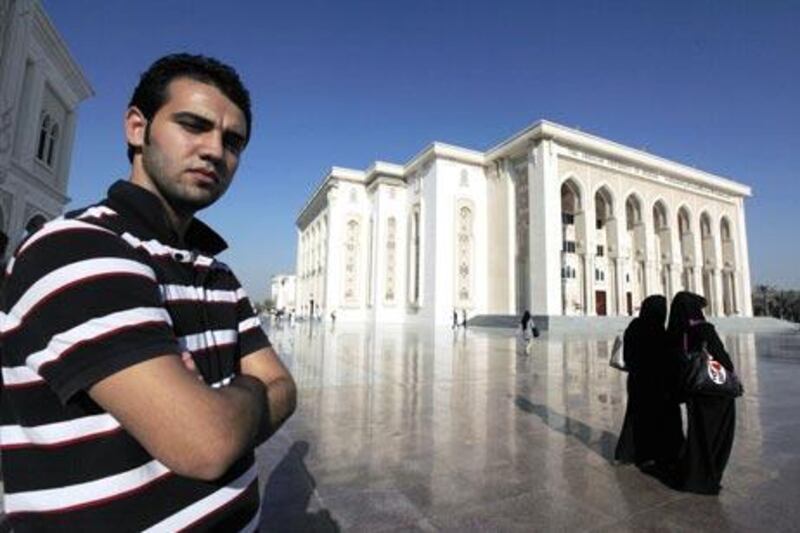DUBAI // A university computer whiz has harvested thousands of pictures for an online popularity contest after being inspired by a film about the founder of the popular social networking site Facebook.
Mohammed Noor, 20, created the AUS Facemash site, consisting of 5,500 students at the American University of Sharjah (AUS), by using Facebook photos and asked viewers to vote on which was most attractive. He was motivated by The Social Network, which shows how Mark Zuckerberg created a similar website by hacking into the Harvard University computer network and extracting student pictures.
“I was watching it and I thought that I could probably do that too,” said Mr Noor, who is also known by the internet moniker Noor Syron. “I had a few complaints but I think most students liked it.” The site generated 150,000 hits in about 40 hours.
The incident alarmed AUS officials, who asked that the site be taken down and organised a conference to discuss methods to protect personal information. Still, some students said they were disturbed to find themselves on the website unawares amid personal concerns.
“I feel like it was an invasion of privacy,” said Saleha Irfan, a 23-year-old journalism student from Pakistan who was featured on Facemash. “It was a shock that this person was able to take my profile picture and put it on this website without me knowing. What was worse is that people were voting on me and you could see the results. I felt violated.”
Some students who claimed to have strict privacy settings on Facebook said they were still featured on AUS Facemash and agreed with a university email that said the site’s creation showed cultural insensitivity.
“I don’t know how he got my picture,” said Dina Gharbo, a 22-year-old Egyptian who is also pursuing a journalism degree. “It wasn’t so bad for us but some people who were married or engaged were also on the site.”
University officials were quick to point out that keeping one’s personal information safe was a personal responsibility. Ironically, the AUS information technology department used Facebook to post a warning about being careful with regard to how users protected their data.
Ashi Sheth, the AUS director of information technology, said in the post.: “Facebook’s greatest strength, the ability to connect people, is also its biggest problem. Facebook has a stated goal of connecting people based on information they provide.
“The way it does this is by sharing the information and forcing the user to choose what they would like to keep private. This can be changed via personal settings, however, it is a step that each Facebook member must take.”
The site presented viewers with two randomly generated pictures of students and asking viewers to click on one. Mr Noor posted a statement shortly before taking down the site saying that anyone who wanted to have their picture removed could send a request to him. University officials said the incident pointed up privacy issues.
Fadi Aloul, an AUS associate professor of computer science who gave a presentation at the conference, said: “Something I always say to students is to never post anything which you wouldn’t be comfortable having your grandma seeing. We wanted to do something for a while about internet security but obviously the events of last week sped up that process.”
The AUS hierarchy also voiced concern, with Dr Thomas J Hochstettler, the school’s provost, expressing anxiety over the use of personal information without prior approval.
“Even though the university is in no way connected to the website, we are dismayed at the intrusion of privacy that has apparently taken place in this instance,” he said.
Mr Noor, a computer engineering student from Syria, completed two years at AUS before shifting to Al Ghurair University in Dubai before this year’s summer break. He said that he had created a similar website for the American University of Beirut, which had attracted fewer than 1,400 hits since being launched on Sunday.
Like Mr Zuckerberg, who went on to become a billionaire, Mr Noor has his own plans for world domination.
“I’m working on something big right now,” he said. “This Facemash [was done] so that people know my name and will be prepared when I release it later on.”
However, he resisted comparisons with Mr Zuckerberg, however favourable they may be.
“I don’t want to be the second Mark,” he said. “I want to be the first Noor.”
[ mcroucher@thenational.ae ]






